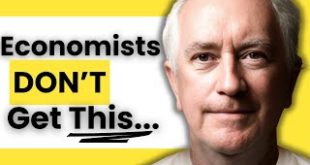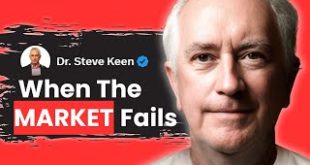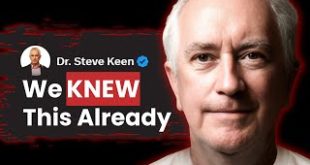Daniel Sanderson makes his return to the show this week to promote his new book and talk about Adam Smith being a Platonist! So is Daniel saying Adam Smith was a hardened fan of the Greek philosopher Plato???
Read More »Capital without Energy is a Sculpture
With the simple insight that “labour without energy is a corpse, and capital without energy is a sculpture”, Steve Keen realised why economists have failed to properly incorporate the role of energy in production for so long.
Read More »Industrial Policy
DT Cochrane joins the livestream this week to talk about Industrial Policy. Industrial policy is government policy to encourage the development and growth of all or part of the economy in pursuit of some public goal. Historically, it has often focused on the manufacturing sector, militarily important sectors, or on fostering an advantage in new technologies.
Read More »The Limits to Growth
System Dynamics was first developed in the 1950s by Jay W. Forrester at MIT. Initially, it was used to study industrial processes. Forrester's big idea was to use feedback loops and time delays to understand how different parts of a system interact with one another. He published the groundbreaking book Industrial Dynamics in 1961, which laid the foundation for this field. In the 1970s, System Dynamics gained wider attention with the release of the famous book The Limits to Growth, created...
Read More »Top Economist Proves Financial Crisis In 7 Minutes
Join ~10,000 others in downloading my free 'Funny Money' Bundle (2 books, worth $60): new.stevekeenfree.com Engineers, Finance, and IT Pros: Learn 50+ years of Real Economics in only 7 Weeks. Weekly with me. Learn more: apply.stevekeenfree.com -- Who is Dr. Steve Keen? Dr. Steve Keen is an influential economist who has dedicated over 50 years to challenging mainstream economic theories. Since his days as a university student, he has been engaged in a David vs. Goliath battle against...
Read More »Mainstream Economics Ignores Money’s Impact.
Mainstream Economics Ignores Money's Impact.
Read More »Politico-Financial Complex Exposed.
Politico-Financial Complex Exposed.
Read More »Innovation or Obsolescence? The Economic Dilemma.
Innovation or Obsolescence? The Economic Dilemma.
Read More »The Myth of Taxation Explained.
The Myth of Taxation Explained.
Read More »Banking Sector: The Real Problem?
Banking Sector: The Real Problem?
Read More » Steve Keen’s Debt Watch
Steve Keen’s Debt Watch










